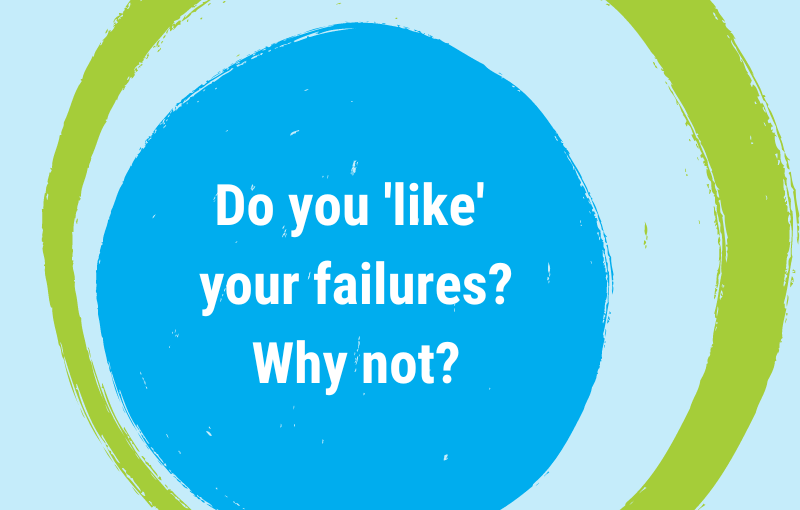“It is impossible to live without failing at something, unless you live so cautiously that you might as well not have lived at all, in which case you have failed by default.” (J.K. Rowling)
Do you ‘like’ your failures? ?
-
- What have been the 3 biggest failures in your life so far?
- What were your 5 most important failures last month?
- How often did you fail last week?
- What’s your most recent failure?
Do these questions make you feel uncomfortable?
Most of us don’t like to talk about our failures. And we don’t like to think about them.
Instead, we try to forget them as quickly as possible.
And if we don’t manage to get them out of our mind, we at least try to hide them from other people’s eyes.
We tend to fear failure and try our very best to avoid failure because we feel bad when we fail.
But the only reason why we feel bad about our failures is because we have negative thoughts about failing.
What is failure?
Failure happens when we set out to do something, and we have an expectation of the result of our action(s), and then we miss that expectation, we don’t achieve the result we wanted to have.
At this point, failure is still something neutral, it’s neither negative nor positive. It’s just something that didn’t turn out the way we had expected.
We have complete control over how we think and feel about the missed expectation and result.
A little side note: There was a time in our life when we all enjoyed failing
We all know from our own experience that falling down and failing while learning to walk is a precondition of becoming successful at walking.
You might not remember it but as a baby you most probably enjoyed the process of continuously failing: falling down, getting up, falling down, … . Giving up was no option, each failure/falling helped building up strength and capability, and success was just a matter of time – finally you walked!
How failure can become something negative
We get to decide what we are going to make it mean if we miss our expectations.
How we think about the ‘failure’ determines how we feel about it – which finally changes the neutral fact of a missed expectation into a negative or positive experience.
Unfortunately, we very often decide to think about failed expectations in a negative way, in a way that creates negative feelings – disappointment, shame, pain.
That’s why we try to avoid failure – we want to avoid the negative feelings we associate with it.
How failure can become something positive
However, we are free to choose having positive – or at least neutral – thoughts about failure.
We can decide to think, ‘O.k., I missed my expectation, I didn’t achieve the desired result this time. That’s not the end of the world. It’s actually a learning opportunity. I can have a closer look at it and learn and then try it again in a different way.’
The better we get at having positive feelings about failing, the more willing we are to try and do what we need to do on the way to our success. The more often we are willing to risk missing our expectations, the more we are going to learn, and the better we are getting at meeting our expectations – and becoming successful.
How to become better at failing
We can increase our chances of success by getting good at failing.
We learn to get good at failing by doing it often. And by appreciating and using each failure as a learning opportunity.
EXERCICE 1
Think about an activity, a project or a task that you actually want to do but that you have postponed again and again.
Are you trying to avoid failure?
Decide now that you will no longer allow fear of failure hold you back.
Describe what you are expecting to get out of it, what results you wish to achieve.
And then do it.
-
- The worst thing that can happen is that you fail and that you allow yourself to think and feel bad about it.
- A great thing that can happen is that you fail and feel good about it, and use it as a learning opportunity.
- Another great thing that can happen is that you succeed – not only because you get the result you want but also because you experience what can happen if you don’t avoid failure.
EXERCISE 2
Appreciate each failure experience as a learning opportunity.
Read the questions about past and current failures on the top of this article again.
And take the time to answer them.
Then lean back and consider
-
- How did these experiences help you learn and evolve?
- How did they help you getting better at doing difficult things?
- How can they be seen as proofs of your courage, decisiveness and determination?
- How did they benefit you although or even because they didn’t result in what you expected?
“Failure is something you have to consider as something you want to include in your life. It’s not something to avoid. It’s actually something to pursue and to get very good at.” (Brooke Castillo, The Life Coach School)

